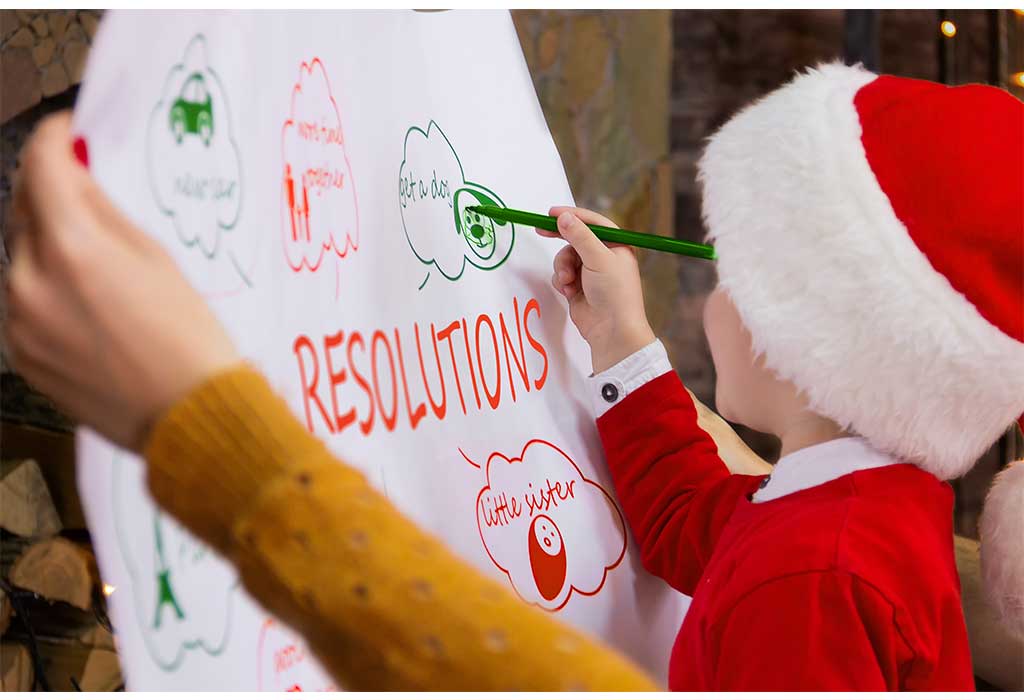Last Updated on December 9, 2025
New Year is a time for new beginnings! The year-end gives us a chance to look back on the time that has gone by, helping us reflect on our choices, decisions, and their outcomes. Even if we’ve had a great year, we’re always left wanting a little bit more to achieve. To plan the year ahead with an aim to accomplish it all, we make resolutions.
Thank you for reading this post, don't forget to subscribe!
New Year resolutions are a tradition that encourages us to aim to do something to improve our lives, give up a bad habit, correct a past mistake, or even experience something new with the hope of having each year better than before. This year, let us explain this tradition to your child and get them excited about making a few New Year’s resolutions for kids.
By discussing New Year resolutions for kids, you can inspire them to set goals for the coming year that foster positive habits and personal growth.
What Are New Year’s Resolutions?
New Year’s resolutions are promises people make at the beginning of a new year to improve themselves or their lives. These goals can be about being healthier, learning something new, or being kinder to others. This tradition has been around for a long time and helps people think about how they want to grow and change in the coming year. While many start off excited, keeping these promises as the year progresses can be challenging. However, with a little determination and support from friends and family, anyone can work towards making their resolutions a reality!
Why Is New Year’s Resolution Important For Kids?
Understanding the importance of New Year’s resolutions can help kids learn valuable lessons about goal-setting and personal growth. In this section, we will explore how good New Year’s resolutions for kids can positively impact their lives.
1. Teaches Goal-Setting
New Year’s resolutions help kids learn how to set goals and break them down into smaller, achievable steps, a skill they will carry into adulthood.
2. Builds Self-Discipline
Working towards a resolution fosters self-discipline and commitment, which are essential for personal development and achieving success in various areas of life.
3. Encourages Resilience
Not every goal will be easy to reach, and learning to overcome challenges helps kids build resilience, preparing them to tackle obstacles in the future.
4. Boosts Confidence
Achieving resolutions can enhance children’s self-esteem and confidence as they see their efforts lead to tangible results and personal growth
5. Promotes Positive Habits
Setting resolutions encourages kids to adopt healthy and positive habits, such as being kind, staying active, or improving their study skills, which can benefit them throughout their lives.
How to encourage your child to make resolutions?
Encouraging kids to make resolutions is a great way to teach responsibility and goal-setting. With gentle support, they can turn small promises into big achievements.
1. Do It Together
Share your resolutions with your child so that they are also encouraged to make some of their own. You can adopt a technique to keep each other in check, to make sure that you follow them through the year.
2. Make It Fun
Resolutions don’t just have to be about rules and the serious stuff. They can be something fun or even something crazy, like you can resolve to attempt making a 5-tiered cake for your parent’s birthday or anniversary this year. Or it could be something sweet like resolving to volunteer at an NGO.
3. Let Them Make Their Own Resolutions
As parents and educators we are bound to have many expectations from our kids and students. However, when it comes to resolutions, you must let them decide for themselves. After all, they need to reflect on the expectations they have from themselves. And when it comes from within, it will be easier for them to follow through. If they’re looking for guidance on how to pick a resolution, be there for them.
4. Lead by Example
Children often learn by observing their parents and caregivers. Share your own resolutions and the reasons behind them. Demonstrating your commitment to personal growth inspires your child to take their resolutions seriously. Engage in discussions about the challenges and successes you encounter along the way, fostering an environment of mutual support.
5. Create a Vision Board Together
Turn the resolution-making process into a creative activity by making a vision board together. Gather magazines, stickers, and art supplies to visualize goals and dreams. This fun and interactive approach helps your child articulate their aspirations and makes the experience memorable and engaging.
6. Set Achievable Goals
Encourage your child to set realistic and achievable resolutions. Help them break down larger goals into smaller, manageable steps. This way, they can celebrate small victories throughout the year, which boosts their confidence and motivation to stick with their resolutions.
7. Establish a Regular Check-In Routine
Schedule regular check-ins to discuss progress on resolutions. This could be a monthly family meeting where everyone shares updates, challenges, and successes. These sessions promote accountability and provide an opportunity for encouragement and brainstorming solutions together, reinforcing the idea that working towards goals is a shared journey.
New Year Resolutions for Children

If your child is new to understanding New Year resolutions, they might be wondering what all they can resolve to do. While the actual answer is- anything they want! You can guide them with a few examples of your own resolutions or show them this list of suggested resolutions below:
1. I shall complete my homework on time
2. I shall reduce my screen time and replace it with playing outside
3. I shall read at least one new book a month
4. I shall help out a friend in need
5. I shall not fight with my sibling
6. I shall help out mom and dad with household chores
7. I shall learn to cook a new recipe
8. I shall take responsibility of organising and keeping my room clean
9. I shall obey my parents and talk to all elders respectfully
10. I shall learn (a new skill like riding a bike, photography, blogging) this year.
11. I will try a new sport or physical activity to stay active and healthy.
12. I will spend more time with my family, such as having game nights or movie nights together.
13. I will volunteer my time for a community service project or help out at a local charity.
14. I will keep a journal to express my thoughts and feelings, helping me reflect on my day-to-day experiences.
15. I will practice gratitude by writing down three things I am thankful for each week.
We hope this article has encouraged you to teach something new to your child. With strong resolutions and some support in following through with them, you will have a fantastic year ahead! Happy New Year!
Also Read:
Essay on New Year for Children
Speech on New Year for Students
New Year Family Holiday Traditions
New Year Family Movies to Watch with Family











